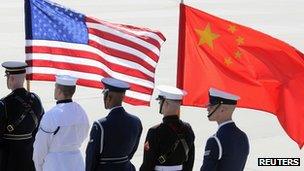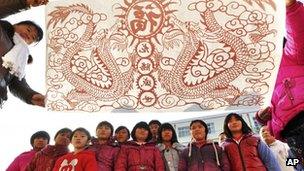Barack Obama confronts the China challenge
- Published
- comments

A year ago, China was a model of development for the US. Now, it is very different.
A year ago US President Barack Obama was holding up China as an example of what a country can achieve if it invests in infrastructure, education and innovation.
But, at the start of this election year, his State of the Union address has painted a wholly different image of China, as a place that does not play fair, that steals intellectual property and gives huge handouts to its manufacturers.
America, President Obama said, is not going to stand by while that happens, and he has promised to take action.
It is tempting to put this clear shift in his tone towards China down to American electoral politics.
But it also appears to be driven by the desire to reverse the image that America is clearly in decline, while China is inexorably rising.
In both of Mr Obama's State of the Union speeches in 2011 and 2012 China has been prominent, getting four mentions each time.
Different rules
A year ago the references to China were positive by contrast to America. This year, his mentions of China were almost exclusively negative.
"I will not stand by when our competitors don't play by the rules. We've brought trade cases against China at nearly twice the rate as the last administration - and it's made a difference," said Mr Obama, to applause from his audience.

Mr Obama said China was educating its children earlier and longer
The idea that China is an unfair competitor and a threat to American jobs and businesses has a powerful appeal in the US.
On the evidence of this speech, it is going to be a recurring refrain in the coming US presidential election.
"Over 1,000 Americans are working today because we've stopped a surge in Chinese tyres. But we need to do more. It's not right when another country lets our movies, music and software be pirated. It's not fair when foreign manufacturers have a leg-up on ours only because they're heavily subsidised," the president said.
Mr Obama's Republican rivals have already singled out China and its trade practices for criticism, now he too is picking up this theme.
Perhaps to show he means action the president said he is creating a new body tasked with looking into unfair competition.
"Tonight, I'm announcing the creation of a Trade Enforcement Unit that will be charged with investigating unfair trading practices in countries like China."
That will not go down well in China, where it is almost certain to be seen as little more than populist electioneering, an attempt to blame China for America's woes and it's lack of competitiveness.
America, many will point out, has serious problems of its own to address if it wants to end its trade deficit with China. But lambasting China is likely to be something you hear from all sides in the coming US election.
Strategic shift
Compare what President Obama was saying a year ago. In his 2011 speech he praised China as a model for what can be achieved. "China is building faster trains and newer airports. Meanwhile, when our own engineers graded our nation's infrastructure, they gave us a 'D'."
He almost seemed to be talking America down and talking its competitors up.
"Nations like China and India realised that with some changes of their own, they could compete in this new world. And so they started educating their children earlier and longer with greater emphasis on maths and science," he said.
"They're investing in research and new technologies. Just recently, China became home to the world's largest private solar research facility, and the world's fastest computer."
Now it seems the White House has decided that it's time to stop speaking of China's achievements and to start reasserting the United States' position as the pre-eminent power both in Asia and globally.
President Obama began to stress America's 'strategic shift' towards Asia late last year, and he reiterated it in his State of the Union address.
"We've made it clear that America is a Pacific power... America is back. Anyone who tells you otherwise, anyone who tells you that America is in decline or that our influence has waned, doesn't know what they are talking about."
The sense of American decline is often associated with a matching sense of China's rise.
In China, America and elsewhere there have been many who have seized on this as the inevitable story of the coming century.
President Obama seems to want to reshape the debate, to rewrite, as it were, the future, and set out an optimistic vision of America for his election campaign.
But, whichever way round the president chooses, talking up China or talking down China, the impression is the same.
The idea that China now poses a challenge which the US must confront seems to have embedded itself in America's consciousness.